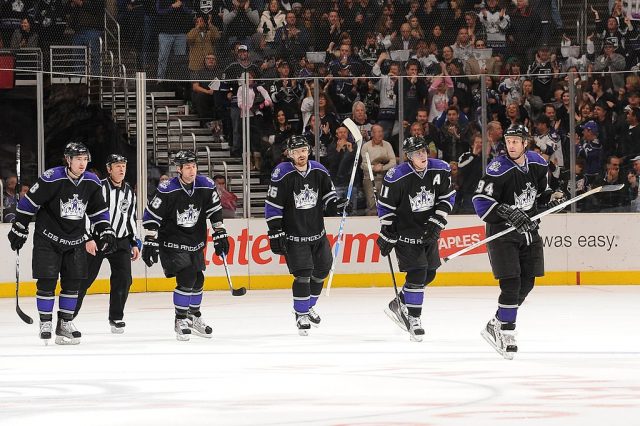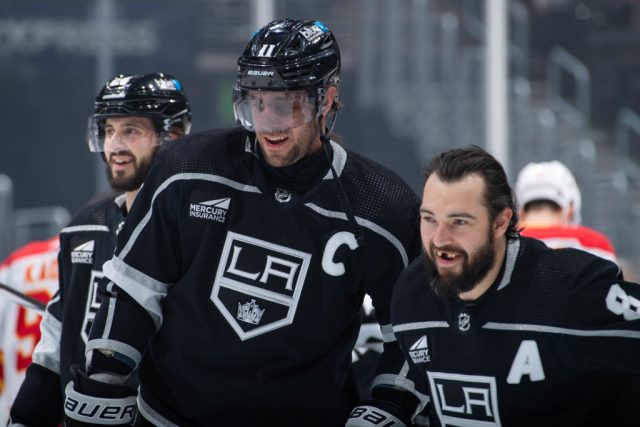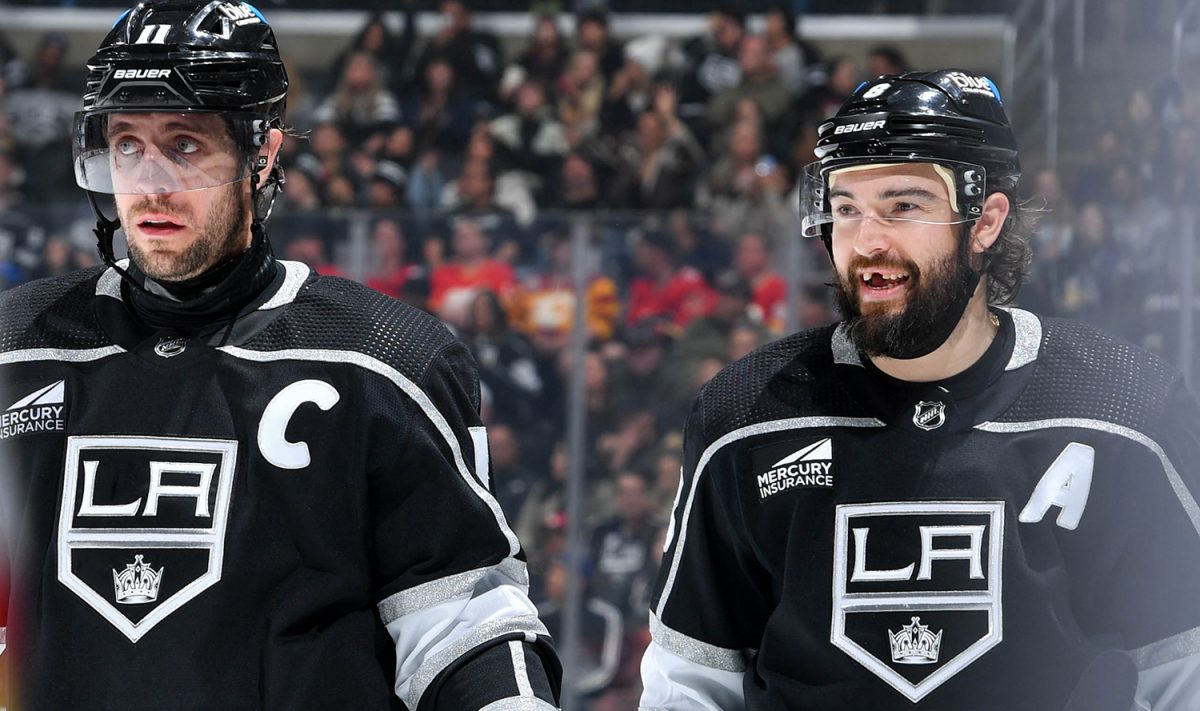It’s in these moments, teetering on the brink, that your team’s DNA is revealed.
As the Los Angeles Kings head off to Edmonton for Game 5, trailing 3-1 in the series and needing a win to prolong the season, it’s no secret to whom every single person in the Kings’ room is looking at for answers.
Makes you wonder how it all comes to be, things like leadership and character.
In what moment does the mentee become the mentor?
Is it the moment you hold the Stanley Cup over your head? Or is it the moment you do it again?
Maybe it’s the moment when things don’t exactly go your way and you suddenly realize that the days when you looked to the older, wiser player for guidance have passed and you understand that the eyes are now upon you.
There are plenty of battle-tested veterans to choose from when you peruse the Los Angeles Kings roster.
Viktor Arvidsson, a Stanley Cup finalist in Nashville in 2017.
Phillip Danault, a Stanley Cup finalist in Montreal whose team erased a 3-1 series deficit against Toronto in 2021.
Trevor Lewis, back to Los Angeles in the twilight of his career after winning two Cups with the Kings.
But make no mistake, for the Los Angeles Kings it begins and ends with the captain, Anze Kopitar, and the eternally youthful Drew Doughty.
With an elimination game in the offing it’s good to be mindful of just how profound the impact these two players have had on this franchise for well over a decade and the impact they continue to make on an almost daily basis.
GM Rob Blake, a Hall of Famer in his own right, played with Anze Kopitar during Kopitar’s rookie season in 2006-07.
Kings defenseman Jordan Spence was nine years old watching the 2010 Olympics in his pajamas in the middle of the night in Japan cheering on Team Canada when Doughty was a member of Canada’s Olympic team in Vancouver. Now Spence goes to work every day with Doughty.
“He was one of my favorite players when I was growing up,” Spence said. “So actually getting to meet him for the first time it was pretty cool. He’s a leader on the team on and off the ice. It’s pretty cool to be beside him and play with him, especially what he does and how he handles situations. So it’s been an honor really.”
I spoke with a long-time NHL executive recently about Doughty and Kopitar.
“The genius of those two guys is that they do everything right and they have their art,” the executive said. “There are a lot of great players but as a guy told me there’s a difference between a player and a winner. These two guys are winners. That’s what they are bred to be.”
Both Kopitar and Doughty appear destined to be called to the Hockey Hall of Fame when their playing careers are done. Would it have been so had they not had the good fortune to be nurtured and guided by a strong cadre of veterans in their formative years in Los Angeles in the same way that they are now nurturing young players like Spence or Mikey Anderson or Alex Lafferiere.
And years from now will reporters be asking those players about the impact Kopitar and Doughty had on their sparkling careers?

Photo by Juan Ocampo/NHLI via Getty Images
Justin Williams was traded to Los Angeles in March of 2009.
He’d won a Stanley Cup in Carolina in 2006 but Williams, who is now a consultant in Carolina, thinks of those teams he was part of in LA as the blueprint to building a winner. It starts with the young talent, of course, but those players have to learn how to win and generally that means learning from older players who have had the experience of winning, of overcoming adversity and who have the temperament to share their experiences with the younger players.
“You need those older guys to help these young guys nurture their ability to be leaders and to carry it forward and not just be good for a couple of years but be good for a long time,” Williams said.
As a forward, Williams saw immediately the role that Kopitar was destined to play for the Kings.
“He was very, very quiet when I came in,” Williams recalled. “You could tell he was a leader though. He was the guy that played the most. He got the most points.”
The two have remained good friends over the years and there is a kind of reverence from Williams who is considered one of the greatest playoff performers of his generation for the kind of person and player that Kopitar has become.
“Kopi, I’m so impressed with what he’s become since then,” said Williams, who was named playoff MVP during the Kings’ second Cup win in 2014. “He’s stayed really humble throughout the years.”
A decade after that second Cup win, Williams sees Doughty and Kopitar as the guideposts for a talented group of players that include Quinton Byfield, Kevin Fiala, Kopitar’s regular line-mate Adrian Kempe.
“Everybody wants to be good for a long time but you need to start somewhere,” Williams said.
The good teams aren’t the lucky ones but the ones with good leadership that creates a trickle-down effect on the rest of the roster for the next generation of leaders.
“That’s the goal right just to transfer it on and have the dressing room rule and govern itself,” Williams said.

Photo by Juan Ocampo/NHLI via Getty Images
Doughty played alongside veteran defenseman Rob Scuderi after Scuderi had gone to back-to-back Stanley Cup finals in Pittsburgh, winning a Cup in 2009. Scuderi would help the Kings win their first Cup in 2012 and Doughty credits Scuderi with helping him learn the fundamentals of being an all-around NHL defenseman.
“It was a great fit for me, very, very good defensively, one of the best sticks, he taught me a lot when it came to that stuff,” Doughty said. “Helped me positionally. “We had a lot of help. We had a lot of great veteran guys and now it’s me and Kopi’s turn to be that for the young guys.”
Scuderi thinks often of Doughty in his current role in player development with the Nashville Predators because Doughty approached the game and developed in a unique way.
“He was just having fun with the game. Just enjoying the process,” Scuderi said. “Everybody does it just a little bit differently. I really enjoyed playing with Drew. You take the work seriously but it’s a sport, it’s fun, it’s okay to laugh every once in a while if you have a terrible turnover.”
He still sees that same joy in Doughty’s game even if he is now a player who carries the extra burden of leadership.
“He’s older, he’s got more responsibilities but he still plays with a lot of passion, with a lot of pride. I still think he has a lot of fun,” Scuderi said. “I hope he does.”
Kings broadcast analyst and long-time NHL player Jarret Stoll had already been to a Stanley Cup final with Edmonton in 2006 when he arrived in Los Angeles. By then he already knew what the Kings had in Kopitar.
“When I first met Anze, just how quiet he was he was calm, cool and collected, never got too high, never got too low, played the same way all the time,” Stoll said. “He was just reliable and consistent and he still is today, plays the exact same way. It’s crazy.”
Drew was a different beast altogether.
“With Drew he was a young guy coming in he was 18 years old and just played like he was 30. Played with no care in the world,” Stoll said. “Just out there free-wheeling and doing what he does, letting his hockey sense take over and his skill take over. He was our number-one defenseman at 18, 19 years old.”
A team isn’t a static thing. Even if there is consistency in the core, as there has been with the Kings with Doughty and Kopitar combining for 2,550 regular season games all in a Kings jersey, those players evolve and change and, yes, age.
The veterans they looked to – Stoll, Scuderi, Williams, Matt Greene, et al – retire or move on or both.
“I don’t know if there’s a switch but there’s a certain point in your career where you realize, for Kopi it was a couple of years sooner than it was for Drew, that you realize that younger guys are coming up and now it’s your time, your turn to pass on your knowledge, to pass on things that you’ve learned,” Stoll said.
There is a selfless part of this process. Like when Kopitar opened his home to then Kings prospect Jaret Anderson-Dolan a few years back.
But there’s also the understanding that there’s a means to an end if you do it right.
“They realize there was a reason why we won and they want to win again,” Stoll said.

Photo by Noah Graham/NHLI via Getty Images
And it’s not like the young Kings are getting sage advice from veterans whose own contributions are diminishing. For both Doughty and Kopitar the opposite is true. Doughty led the NHL in ice time during the regular season and has added two goals in four games against Edmonton. Kopitar was a beast in the Kings’ Game 2 win with two primary assists and the overtime winner and remains one of the game’s premier two-way centers.
“He’s obviously our guy here. He’s the model and he’s the guy we want to look to and comes through big for us,” Anderson said of the team’s captain. “You see the stuff he does day to day, the maintenance on his body, how he balances life at the rink, he’s running all over the place with two kids. I mean he’s a guy you learn a lot from. Even if you don’t talk to him you just watch the way he acts, his mood at the rink, the way he treats everyone. He’s the model of this franchise for sure.”
Stoll, who lives close to Doughty, said he’s seen the veteran defenseman embrace this new role on many levels in recent years.
“To be a leader, to be someone that people look up to, you’ve got to be mature and for Drew the maturity level for him the last five years has been unbelievable,” Stoll said. “All of a sudden you would notice things on the ice that he was doing that he didn’t really do before, off the ice that he was doing that he didn’t really do before and it’s a huge factor now in the last couple of years.”
Here’s the thing, this wasn’t necessarily a role that Doughty imagined himself assuming even as he has embraced that very role.
“Honestly, when I was young I never even thought about really wanting that role,” Doughty said. “I wanted to just go and play and have fun. As I grew older the veterans started retiring. I realized I had to do that. Now I cherish that. I love being a leader.”
It’s a simple word and a complex idea. It means knowing that people are going to watch you and absorb what you do, how you act. And, of course, they’re going to ask you stuff.
“For me, individually, I just try to learn the stuff that he does on the ice,” Spence said of Doughty. “He’s playing that many minutes for a reason and obviously if I do have questions or if I’m confused at some things I always go up to him because he has most of the answers just because he’s been in the league for so long now that he probably has had the same questions when he was growing up.”
And Spence knows that when he asks Doughty will not sugar coat any answers.
“That’s what I really like about him too,” Spence said. “He doesn’t make lies, he’s a straight shooter. When it’s on his mind he’s going to speak it, that’s what we like about him, he’s always honest about what he thinks, he’s always voicing his opinion all the time. That’s why he’s one of the leaders here we’re really lucky to have him. I’m really happy to be playing with him.”
To be anything other than who he is seems almost inconceivable for Doughty. That means speaking his mind and wearing his heart on his sleeve.
“I’m very honest person when it comes to everything basically in my life,” Doughty said. “I don’t believe in telling someone they’re doing okay when they’re not just to not hurt their feelings. I’d rather just come across honest and be straightforward.”
Sounds exactly like the kind of person you’d like to suit up alongside with your season hanging in the balance.

Photo by Juan Ocampo/NHLI via Getty Images


Rules for Blog Commenting
Repeated violations of the blog rules will result in site bans, commensurate with the nature and number of offenses.
Please flag any comments that violate the site rules for moderation. For immediate problems regarding problematic posts, please email zdooley@lakings.com.